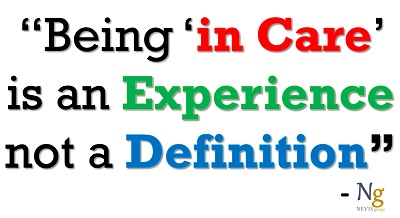Labels are for clothes not people
Topic: Corporate parenting, Foster care, Health and Wellbeing, Kinship care, Local authority, Looked after at home, REACH, Residential care, Throughcare and aftercare, Voices of young people
Author: Claire Burns
Introducing issue 12 of REACH, which explores stigma, language, perception and the representation of care and care experience.

Language is powerful. It can be inspiring, it can be divisive: it can unite and it can ostracise. While the use of some language evolves, at times, no matter how unintentional it might be, it can be damaging nonetheless. Labels put people in boxes. The individuals in any group, cohort or population simply share a common attribute, experience, or interest, however the individuals themselves are still different and unique in many other ways.
A platform for thoughts
So this issue of REACH is being given over as a platform for thoughts, perspectives, and the personal experiences of those affected by and working to better understand and address attitudes: attitudes, and their associated behaviours, that can have a detrimental effect on the lives and wellbeing of children, young people and adults who have had, or are still experiencing care. The theme is explored through personal accounts, the use of literary and creative expression, and research. In doing so we also hear about people who have inspired, encouraged, and demonstrated very real, positive experiences and lives, away from the stereotypes, labels or faceless statistics.
We explore stigma, language, perception and representation through employment and employability; mental health and wellbeing; the view from and of the children's services workforce; and how and why stories and statistics can paint a binary picture of superheroes or villains, or triumph over adversity vs hopelessness and written-off.
To give you just a flavour of the content, in conversation for REACH, BBC journalist Ashley John-Baptiste reflects on his own experiences, the influences and opportunities that enabled him to learn and grow, and how he now sees the narrative as a journalist; Charlotte Armitage shares why the complex superhero characters carefully crafted by Stan Lee tell us something about how we see others; and Joe Gibson explains how employment opportunities should and can be open to all.
Are attitudes changing?
We hope the timing of this REACH is helpful – more and more we are seeing that challenge to attitudes that create barriers to opportunities are rightly coming to the fore. The Independent Care Review, who we will hear from in this issue, has a working group dedicated to how to tackle stigma, and perhaps we are beginning to see some more informed media reporting, programme making and public messaging. In fact, as we start to publish this week, a new documentary on Channel 4 presented by Lemn Sissay has just aired a few days ago, powerfully exploring many of these issues. To see care experienced teenagers express their thoughts and lives through performance and tell their own stories, hopes, and dreams through their own words in the media coverage associated with this programme too has reminded us again that children have a voice, we must hear them.
It is possible that the views shared, terms used, and perspectives explored in this edition may in themselves vary, prompt discussion or may change minds, behaviour or practice. We are very grateful to all those who have contributed. It is right that we are respectful and consider the personal perspectives shared – to expect that there is a singular view or experience is contrary to the very issue at hand. But what is clear is that: people with care experience are stigmatised; that the challenge and discrimination this leads to is unacceptable; and that we should listen carefully to what people with direct experience tell us so that we can work to reduce stigma and discrimination and their effects.
Listen to understand
We live in communities and a society where we are increasingly calling out stigma every day, be it gender-specific or race or religion, based on ignorance, misogyny, prejudice or even hate, and it can never be excused. We are all unique, with strengths and rights.
We hope that this issue of REACH provides food for thought, and stimulates positive change through learning, as we always endeavour to do. For people working to improve the lives of children, young people and adults with care experience, and their families, looking to ourselves - getting 'our own house in order' - seems like a good place to start and we can only do that if we listen to, understand and address this issue more closely.
Claire Burns is Director of Programmes and Services at CELCIS.
The views expressed in this blog post are those of the author/s and may not represent the views or opinions of our funders.
Commenting on the blog posts: sharing comments and perspectives prompted by the posts on this blog are welcome.
CELCIS operates a moderation process so your comment will not go live straight away.


